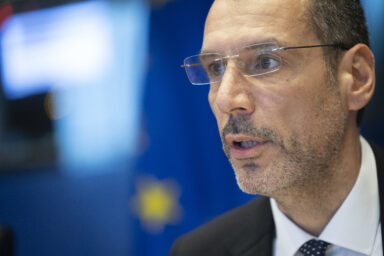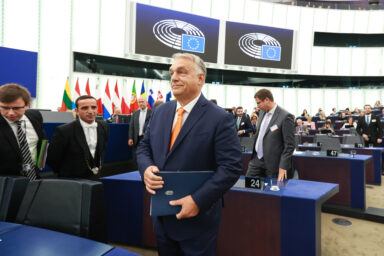Representatives of member states at the upcoming Council of Environment Ministers will most probably not vote on European climate targets for 2040. Some Central and Eastern European countries with a high share of energy-intensive industries have been particularly vocal in their opposition.
Shortly before the start of the Council meeting on Thursday, September 18, the Danish Presidency altered the agenda concerning the European Climate Law. It is through the amendment of this law that a binding climate target for 2040 is to be incorporated into European legislation. Now, the EU environment ministers are supposed to “hold a policy debate”, but no voting is expected according to the agenda.
Industrial countries in opposition
The 2040 Climate Target has been proposed by the European Commission in early July 2025. The target envisages reducing the EU’s net greenhouse gas emissions by 90 per cent by 2040, relative to 1990.
However, implementation requires the approval of a qualified majority of member states and of the European Parliament. At present, it appears that this majority does not exist. From the very beginning, it was mainly Central and Eastern European countries with a high share of heavy industry, such as Czechia, and Poland, that were against. In total, 11 of 27 member states asked for a delay.
A ministerial discussion will still be held on Thursday, 18 September to prepare ground for a later debate on leaders’ level. A spokesperson for European Council President António Costa had earlier said that leaders would hold a ’strategic discussion’ at their 23 October summit. The topic should be ’the best economic strategy is to achieve Europe’s climate targets’.
You might be interested
Target not realistic, Prague says
One of the countries that firmly disagrees with the current form of the 2040 Climate Target is Czechia. “We are an industrial country, and at this point we do not know how technology will develop in different industrial sectors, such as steel, cement production, chemicals, and glassmaking. It is therefore necessary for the 2040 climate target to be realistic. That is why we disagree with it in its current form and want to continue discussions,” Petr Hladík, Czech Environment Minister, told EU Perspectives.
We do not know how technology will develop (…) The 2040 Climate Target needs to be realistic. — Petr Hladík, Czech Environment Minister
Veronika Krejčí, spokesperson for the Czech Ministry of Environment, confirmed that the Czech government is calling for a reassessment of the 2040 Climate Target. “Czechia together with other member states asked not to vote on General Approach and called for further comprehensive negotiations on the 2040 Climate Target, and we succeeded,” Ms Krejčí said. She also added that “Among other requirements, Czechia will request information on the impact on individual economic sectors as well as on each member states.”
It is unclear at this point how the discussion at the Council will proceed. Approached by EU Perspectives for details, the Danish Presidency declined to comment.
The 2035 target also at risk
To make matters even more complicated, the above mentioned delay also raises questions about the EU’s emission “target” (indicative contribution) through 2035. The latter is required under the Paris Agreement approved in 2015. Ministers were expected to vote also on that goal. The Danish Presidency and Commission intended to derive the 2035 target from the 2040 legislation.
The United Nations set a late September deadline for the 2035 national determined contributions. In the EU’s case this is now likely not to be fulfilled. In light of the upcoming United Nations Climate Change Conference (COP30), which will start on 10 November, 2025, in Brazil, some experts are saying that the EU could lose its position as a world climate leader due to the delay.











